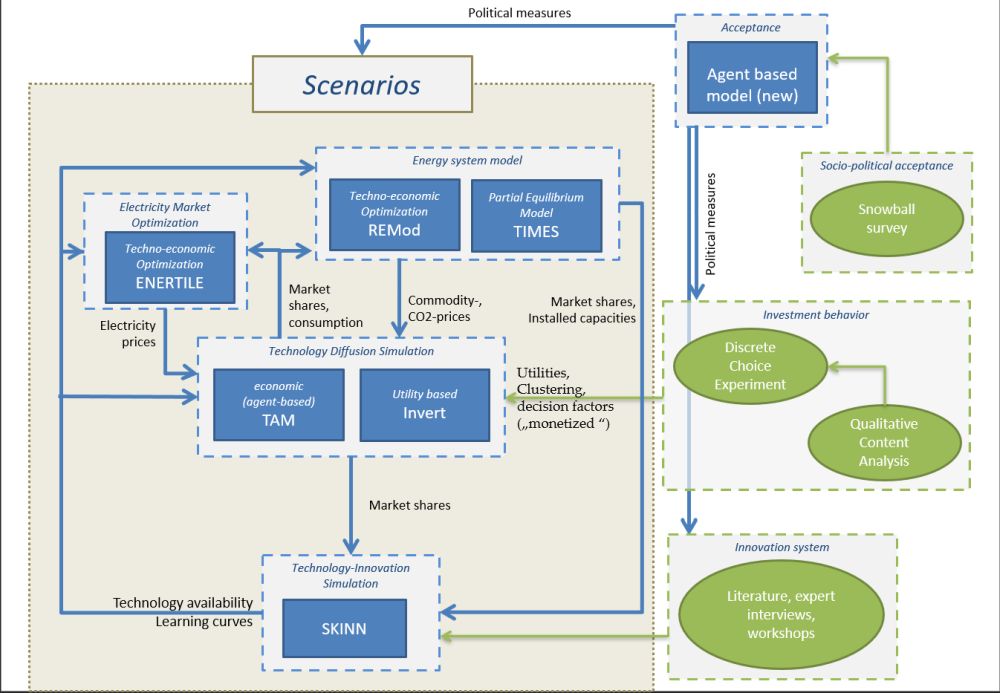| Duration: | 10/2019 - 12/2023 |
| Contracting Authority/ Sponsors: | Federal Ministry for Economic Affairs and Climate Action (BMWK) |
| Project Partners: | Fraunhofer-Institut für System- und Innovationsforschung (ISI), Karlsruhe; Institut für qualifizierende Innovationsforschung und -beratung (IQIB), Bad Neuenahr-Ahrweiler; Institut für Energiewirtschaft und Rationelle Energieanwendung (IER), Universität Stuttgart; Zentrum für interdisziplinäre Risiko- und Innovationsforschung (ZIRIUS), Universität Stuttgart: Institut für Ressourceneffizienz und Energiestrategien (IREES), Karlsruhe; Institute for Future Energy Consumer Needs and Behavior (FCN), RWTH Aachen University; Technische Universität Braunschweig, Institut für Psychologie, Abteilung für Psychologische Methodenlehre und Biopsychologie (IPMB) |
| Webseite: | MANIFOLD - Fraunhofer ISI |
| Project Focus: |
MANIFOLD – Model Development and Model Coupling for Actor Behavior in Innovation and Diffusion Networks
The development of new sustainable energy technologies and their widespread dissemination are essential in order to achieve the necessary reduction in greenhouse gas emissions to mitigate climate change. In order to adequately depict the mechanisms underlying the development and diffusion of innovations in models and thus develop more effective policy instruments, the socio-psychological analysis of actors, actor groups and interactions and thus also the acceptance of the actors is of central importance.
Mapping empirical analyses of actor behavior in (techno-economic) energy system models is often difficult in practice. Due to their focus on macroscopic phenomena or their model size, general energy system models often have a structure that does not provide for the mapping of small-scale, microscopic actor structures (e.g. economic sectors as the smallest units of analysis). In techno-economic models that are geared towards a specific section of the energy system (e.g. the thermal conditioning of buildings), it is possible in principle to map such actor structures. However, these models often already have a very high level of detail with regard to the technologies under consideration. Therefore, the additional consideration of different actor groups and subgroups and their interaction with each other reaches its practical limits in terms of acceptable model complexity and resulting computing time. Therefore, the development of independent actor models, in which a focus on socio-psychological aspects is possible, represents an important development step in research.
Despite their primarily techno-economic focus, the project aims to enable energy system models to take into account the results of quantitative and qualitative empirical analyses (e.g. questionnaire studies, conjoint analyses, qualitative interviews, etc.) on the behaviour of stakeholders (e.g. citizens, companies, non-governmental organizations, etc.) better and, above all, with less methodological effort. With regard to system analysis, this should in particular lead to progress in the area of model-based questions of technology acceptance and obstacle analysis and enable a more realistic simulation and analysis of regulatory framework conditions.
In order to achieve these goals, two actor models are to be (further) developed in this project and coupled with energy system models:
- One model focuses on the analysis of the behavior of actors in innovation networks, i.e. actors involved in the research, development and production of new technologies. These primarily include companies and research institutes that generate new knowledge and exchange it via collaborations in order to develop new products (»innovation model«).
- The second model focuses on the analysis of the behavior of actors in diffusion networks, i.e. actors who influence the diffusion of new technologies or other innovations in the market or society as a whole (»diffusion model«). These are in particular (potential) adopters (e.g. households) but also so-called change agents, such as opinion leaders, multipliers or actors with influence on important framework conditions.
